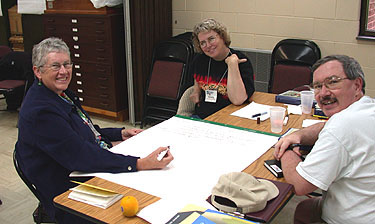|
Biographies:
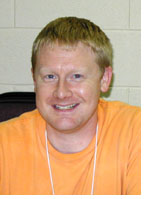
Todd Bowdish
I am currently a biology instructor
at Penn Valley Community College. Penn Valley is one of the Metropolitan
Community Colleges in Kansas City, MO. I have been with the MCC
system for 4 years as both an adjunct and full time faculty member.
I completed my Ph.D. in Biology at the University of South Florida,
Tampa in 1996. My area of research involved the biotic and abiotic
factors that influence population dynamics of salt-marsh planthoppers.
My interest in salt-marshes also included an investigation of several
state-restored marshes around the Tampa Bay area. While finishing
my degree I realized that teaching had been much more rewarding
on a personal level than the research. I am continually looking
into new ways of engaging students in thinking about the concepts
of science, especially in lecture. This is very important in the
non-major General Biology courses that I teach at the present. I
feel that these students that are going on to other disciplines
require the same critical thinking skills and insights that science
majors must develop. Terry Davin, Sandra Landuyt and myself were
involved with the FIRST I project and really came away with a new
sense of purpose in utilizing and honing the techniques discussed
here. We shared the information we learned and continue to employ
the inquiry based learning skills. I am looking forward to interacting
with instructors new to the program and sharing experiences with
old friends.
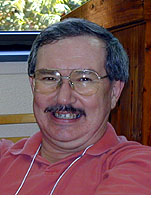
Terry Davin
I am a biology instructor at Penn
Valley Community College in Kansas City MO where I teach a number
of biology courses including non-majors biology, zoology, genetics
and ecology. In addition I have almost 15 years experience as a
player, coach and tournament director in volleyball. My teaching
philosophy is dependent partly on my experiences as a student, teacher
and athlete. I guess I could explain my philosophy as: Doing is
better than Listening. As part of the Penn Valley team I was a participant
in FIRST I which ran from December 1998 to December 1999. Prior
to my participation in FIRST, I had used inquiry-based learning
piecemeal in my classes. However, I had no real organization to
what I was attempting to do, I just knew that what I had been doing
for almost 10 years was not working.
After participating in FIRST I, I
was more organized in what I did in my classes. Students now spend
more time working on projects and discovering information on their
own. My interest in the FIRST II project includes increasing my
use of inquiry based learning in my classes, seeing how others are
using inquiry in their classes, and most importantly looking at
developing rubrics and grading inquiry based projects.
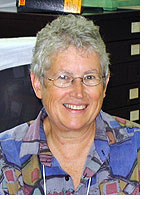
Martha Haehl
I have an M.A. degree in mathematics
from The University of Kansas and have taught math for 28 years.
Like many math instructors, I liked math because it was a "fun
game" and I had no particular desires to study how it applies
to life or other disciplines. A number of years ago, however, I
noticed that my old teaching practices were not as effective as
they used to be. Determined to become an effective instructor for
today's students, I set out to learn ways to make mathematics accessible
and relevant. That desire led me to the most interesting journey
of my teaching career as I began to incorporate writing then reading
approaches for learning mathematics, collaborative work and discovery
activities, and connections between mathematics and other disciplines
or life in general.
Since materials for the way I would
like to teach are difficult to find, I did what I never thought
I would do-write a textbook, "Preparing for Algebra by Building
the Concepts," which incorporated collaborative learning and
discovery activities. Much to my surprise, I enjoyed writing and
have continued writing in collaboration with other math instructors
as well as occupational and vocational instructors on various math
projects. The latest work in progress is a math study skills manual
that focuses on language approaches (writing, reading, and speaking)
to learn mathematics. When I attended a fall 2000 workshop at Penn
Valley Community College on Inquiry Based Learning, I was impressed
with the approach and felt it is what I have been working towards
in teaching mathematics. I am thrilled to be a part of learning
more and to be a part of the Penn Valley team.
Sandra Landuyt
By way of introduction I am a person
with very diverse interests. I have a B.S. in Biology, a B.A. in
Chemistry, a M.S. in Microbiology, a M.A. in Theology (with an emphasis
in pastoral studies) and a Ph.D. in Microbiology (emphasis in industrial/environmental
microbiology and food science). I am a faculty member and chair
of the Division of Life Sciences at Penn Valley Community College
in Kansas City, Missouri. I teach a variety of courses including
general biology, botany, cell biology, nutrition, and microbiology.
Most of my students are taking biology courses as part of their
general education requirements, or are preparing for careers in
the health field. It is rare for me to work with science majors.
On occasion I teach chemistry courses. I am also the Director of
adult religious education/formation and a lay leader of prayer at
my parish in Liberty, Missouri.
In my sixteenth year teaching at Penn
Valley my four passions in life (my family, love of God, the natural
world, and working with non-traditional students) continue to grow
and change. Since the FIRST I experience, I changed all my classes
to inquiry based and tried to create a learning atmosphere that
reflects the scientific method. My classroom is a learning community
where the opinions and experiences of every individual are valued.
I also participated with my colleagues (Terry Davin and Todd Bowdish)
in numerous formal and informal IBL discussions and workshops, in
the metropolitan Kansas City area. I am eager to share ideas and
concerns with participants of FIRST II and look forward to our first
gathering.
Back to Regional
Teams Page
Date Modified February, 2006
Send mail to carl.woods@murraystate.edu
with questions or comments about this web site
|
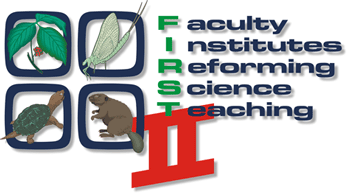
![]()
